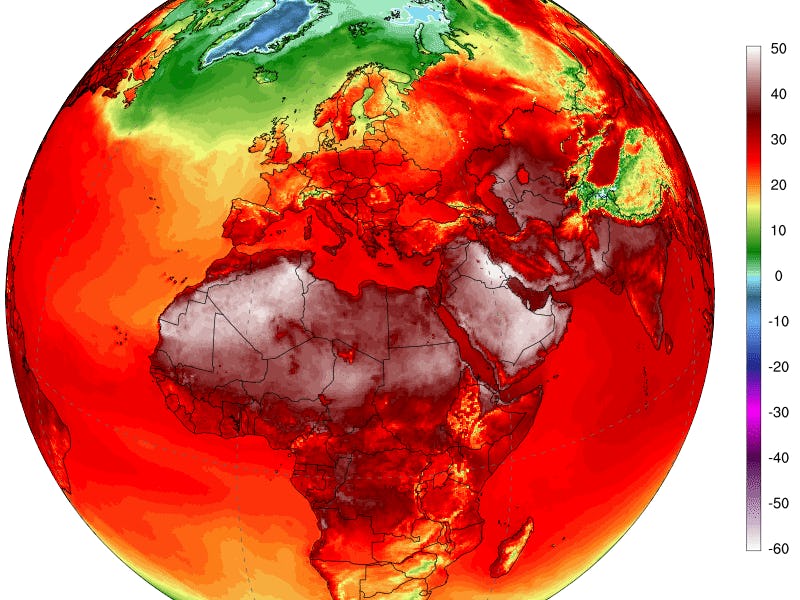Heat Maps Reveal Record-Breaking Temperatures Across the Globe
This week was brutal.

Cities across the Northern Hemisphere witnessed exceptionally high heat this week, with records breaking in North America, Europe, the Middle East, and Western Asia. Besides the long-term effects such temperatures may have on climate change, many of these weather milestones caused immediate hazards. And, according to the most recent weather data from the University of Maine’s Climate Reanalyzer, the high temperatures are not subsiding.
On Thursday, the temperature in parts of Northern Siberia reached 90 degrees Fahrenheit, according to the Washington Post. Northern Siberia sits along the coast of the Arctic Ocean, so it’s highly unusual for temperatures to spike 40 degrees above its average for the season. Other typically cooler locations also suffered during the hemispheric heat wave, resulting in damaged buildings and infrastructure, and in some cases, a spike in heat-related deaths.
The Climate Reanalyzer is a platform developed by the University of Maine and the National Science Foundation to visualize climate and weather datasets. Created by Dr. Sean Birkel of the university’s School of Earth and Climate Sciences, the platform provides access to 10-day forecasts across the globe as well as maps that correlate to historical station data and deeper analysis. The following maps are simulations of maximum temperatures on July 5 and reflect the temperatures measured at two meters above the ground.
North America’s Heat Wave Got Deadly
Both the US and Canada reached milestones in record high temperatures this week. Denver tied its all-time record of 105 degrees Fahrenheit while Burlington, Vermont, set its all-time warmest low temperature of 80 degrees Fahrenheit.
Meanwhile, Canada’s heatwave reached a dangerous new level in Quebec. On Monday, Montreal saw its highest temperature in record history, reaching 97.9 degrees Fahrenheit for the first time in 147 years. On Thursday, CBC reported the heat-related death toll jumped to 18 people in Montreal and at least 34 people across the province.
“Today is the highest-risk day for people who have not had access to cold places,” Dr. David Kaiser from Montreal’s public health department announced. “It’s not over yet.”
Europe’s Heat Wave Melted Buildings
Heat waves stretched across the continent but created the most problems in the British Isles. On June 28, Shannon, Ireland, reached its record of 89.6 degrees Fahrenheit while Belfast, Castlederg, and other cities in Northern Ireland also recorded similar record highs. Scotland set its hottest temperature on record, reaching 91.8 degrees Fahrenheit. This caused problems in Glasgow, which had been suffering its hottest day on record, clocking in at 89.4 degrees Fahrenheit.
Glasgow wasn’t built to withstand such heat, and the record-breaking day caused the roof of the city’s science center to “melt” rubbery goo down the sides of the building.
Asia’s Heat Wave Set Global Records
Many regions within the Middle East are accustomed to high temperatures, but June 28 created a new standard for what the Persian Gulf region could withstand. On Thursday, the coastal city of Quriyat, Oman, never dropped below 108.7 degrees within a 24-hour period, setting the highest minimum temperature recorded on Earth.
Later in the week, Russia and the Caucasus continued the trend of smashing temperature records. On July 2, Yerevan, Armenia, reached 107.6 degrees Fahrenheit, a record high for the month of July. Two days later, Tbilisi, Georgia, reached its all-time record of 104.9 degrees Fahrenheit.
While scientists are still only scratching the surface of how screwed certain cities are due to climate change, the immediate effects from this week were often just as precarious. Considering the Northern Hemisphere’s summer season only just kicked off in June, local governments will have to work with scientists to prepare for the extreme weather ahead.